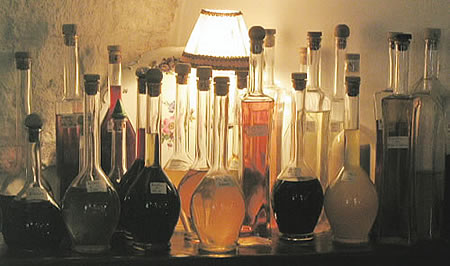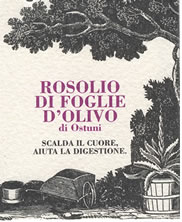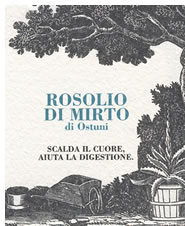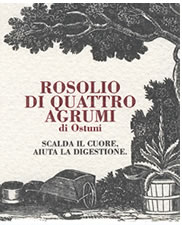|

Masseria Il Frantoio’s Rosolio
Warms ones heart and helps the digestion
 Rosolio di foglie d'olivo Rosolio di foglie d'olivo
Rosolio made with olive leaves
Legend has it that one day, in the shade of the olive trees surrounding the family house, Lady Bimby was ensconced in the study of some yellowing pages. They had been hand-written by her great-great grandmother and spoke of a special recipe: rosolio made with olive leaves and this was how Lady Bimby discovered the secret of this exquisite liqueur. The name “Rosolio” is derived, not as she had always though from roses, but from the Latin “Ros Solis” : ‘the tears of the sun that at day break pearl the leaves, the fruit and the berries’. Today from these very same ancient olive trees we still take the basic ingredients required for this precious infusion: olive leaves, that are gathered in some secret days of the year, thus ensuring a perfect result.
 Myrtle Rosolio Myrtle Rosolio
For thousands of years the myrtle bush, one of the Mediterranean’s truly great plants, has been used for its aromatic qualities . . . the berries for “rosolio” and the leaves to preserve olives in salted water. In Pugliese dialect myrtle is known as “mortedda” and even in ancient Greece it was regarded as a symbol of youth and love and in many countries it is still used to make wedding bouquets. Found all over southern Italy myrtle is an excellent balm, a digestive and a good tonic substance and it has even been praised in verse by Horace and Goethe.
A good recipe idea for Rosolio di Mirto.
Boil 600.ml of full cream milk and let it cool, when cold add 300.g of sugar, 300.ml of pure alcohol and a glass of myrtle rosolio . . . mmmmm, delicious!
Four Citrus Rosolio
 Our Arabic citrus orchard (“Hortus conclusus” in the Latin) is granted protection from the chilly northern winds not only by the main farm house but also its four walls which enclose it. Naturally, it is the principal source of the majority of our fresh, sweet smelling fruit. In the spring the perfumes that exude from its blossoming trees are almost intoxicating and entice bees from far and wide to feed on the vitamin rich pollen: one of the many virtues of citrus fruit. Our Arabic citrus orchard (“Hortus conclusus” in the Latin) is granted protection from the chilly northern winds not only by the main farm house but also its four walls which enclose it. Naturally, it is the principal source of the majority of our fresh, sweet smelling fruit. In the spring the perfumes that exude from its blossoming trees are almost intoxicating and entice bees from far and wide to feed on the vitamin rich pollen: one of the many virtues of citrus fruit.
Our secret in creating this unique beverage lies in finding the perfect balance (of sweetness, strength and aroma) between the four fruits: lemon, orange, cedro and mandarin. Drunk at room temperature it is a perfect digestivo whilst an ice cold glass of “Quattro Agrumi” is a wonderfully refreshing thirst quencher.
Absinthe
In Greek “assenzio” quite literally means ‘bitter’ and is an appetizer. It is found in vermouth which is actually the German name for absinthe. Rubbed against ones skin assenzio is believed to provoke love; “bitter in the mouth, sweet in the heart”. In rosoli the leaves and flower tips of the plant are used. At the turn of the nineteenth century absinthe was very much in vogue in Parisian artistic and literary circles and a significant influence to the works of Baudelaire and Degas.
Carob
Legend has it that whilst he was in the dessert John the Baptist survived on carob and throughout Northern Europe the carob is known as ‘Saint John’s Bread Tree’. The carob was used, until very recently, to make a sweet wine, as a chocolate substitute and the seeds were made into a flour – popularly used in ice-creams. The carob pod (“pistazzi” in Pugliese dialect) contains very hard seeds that weigh invariably 0.2 grams. The weight of this seed was used to evaluate precious stones and gold and this is the origin of ‘carat’ gold, because in Arabic the name for the carob is “quirat” or “carat”. Carob is extremely nutritious (50% sugar) and astringent and has a rich perfume.
Wild Fennel
A symbol of strength, in Greek it is called “ma’ratron” because it grew in abundance by the ‘Marathon’ where heroic gladiators would be crowned as champions. It was also very beneficial to lactating mothers and added to wine it became aphrodisiac. Nowadays it is used in salads and is very good with beans, it is also delicious in taralli biscuits and sausages . . . An excellent digestive.
| 




 Our Arabic citrus orchard (“Hortus conclusus” in the Latin) is granted protection from the chilly northern winds not only by the main farm house but also its four walls which enclose it. Naturally, it is the principal source of the majority of our fresh, sweet smelling fruit. In the spring the perfumes that exude from its blossoming trees are almost intoxicating and entice bees from far and wide to feed on the vitamin rich pollen: one of the many virtues of citrus fruit.
Our Arabic citrus orchard (“Hortus conclusus” in the Latin) is granted protection from the chilly northern winds not only by the main farm house but also its four walls which enclose it. Naturally, it is the principal source of the majority of our fresh, sweet smelling fruit. In the spring the perfumes that exude from its blossoming trees are almost intoxicating and entice bees from far and wide to feed on the vitamin rich pollen: one of the many virtues of citrus fruit. 